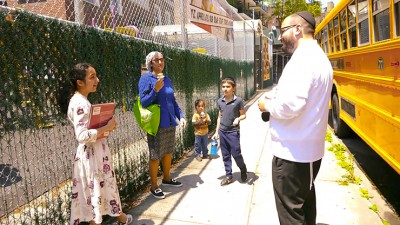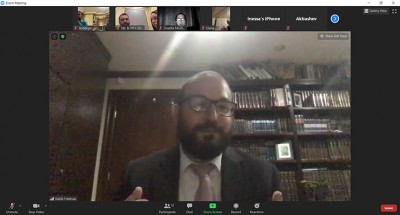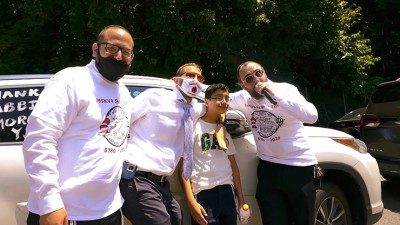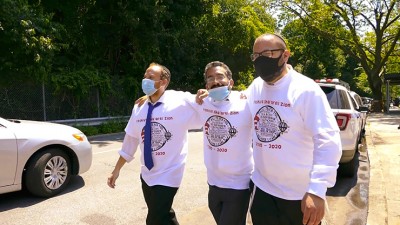



The Bukharian Jewish Link had the privilege to converse with Rabbi Avraham Fridman, who was recently appointed principal of Yeshiva Sha’arei Zion, the Sephardic-oriented elementary school between 75 Avenue and 76th Road along the Grand Central Parkway service road in Forest Hills. We will be presenting a two-part series on the rabbi’s plans and initial encounters with the yeshiva. Rabbi Fridman has been quite impressed with his interactions with the Yeshiva and the experience so far has been absolutely amazing!
The Bukharian Jewish community has a lot to benefit from Rabbi Fridman being the tried and true definition of a facilitator. “I will work with the community and children to ensure that they see their own potential, and the gadlus, remarkable superiority, within themselves,” says Rabbi Fridman. During the pandemic, Yeshiva Sha’arei Zion parents and rabbonim have joined the rabbi on virtual encounters in largely positive experiences. “The parents are very receptive and welcoming and they have a strong passion to see their children succeed,” noted Rabbi Fridman. Such enthusiasm makes the job of educators a fulfilling experience.
Since its inception, the Yeshiva has evolved wonderfully, building various notable attributes. Under Rabbi Fridman’s direction, these qualities will be united with newfound aim, purpose, and direction. To provide a top-notch education with a sought-after culture of learning, organizational structure remains key. Over the next year or two, this culture of excellent education will be further cultivated with pleasing results, yielding YSZ as the premier educational destination for Bukharian boys and girls of Queens. “With much siyatta d’Shmaya, YSZ will create the golden standard of Jewish education, joining the existing pieces,” noted Rabbi Fridman. On the horizon for students will be the addition of many extracurricular activities to both the Limudei Kodesh and General Studies departments that will enhance classroom learning and provide the children with healthy and productive outlets to continue their natural development. The children will learn that everything in this world can be used in service of Hashem to help be an important member of Klal Yisroel.
Rabbi Fridman is a Brooklyn native and graduate of Yeshiva Toras Emes Kaminetz Elementary School (Brooklyn), Mesivta Ateres Yaakov High School (Lawrence), and attended beis medrash for three years in Israel at Yeshivas Toras Simcha (Jerusalem). Upon his return to America, Rabbi Fridman began learning in kollel at the Yeshiva Gedolah of the Five Towns under Rav Yitzchok Knobel shlit”a, and Rav Moshe Katzenstein shlit”a. Rabbi Fridman also achieved a BA in Education and Special Education, MS in School Psychology, MS.Ed. in School Leadership, is a NYS Certified School Psychologist, a NYS Licensed School Building Leader, and a NYS Licensed School District Leader.
A key to the success of any school is a strong connection with the community. “Children do not grow up in a vacuum,” explained the rabbi. “We need to work together with the parents and community to develop our students. It is no secret that Queens is home to thousands of Ashkenazic families. YSZ will continue to provide students with excellence in Limud HaTorah following the Sephardic mehalech.”
Parents often judge an educator by the personal connection their child forms under their tutelage. In 15 years of chinuch, Rabbi Fridman is widely regarded for building a relationship with each student under his supervision. His deep knowledge and understanding of every child provided any parent with solutions to address their concerns. “Relationships are the key to success; to help the children succeed you need to have a strong relationship,” expressed Rabbi Fridman. “L’Havdil Eleph Alphei Alaphot, Hashem counted Klal Yisroel because of his love for them, and I try to emulate Hashem, as the seforim advise.”
Rabbi Fridman’s love for chinuch developed over the years and has become central to his life. Dedicating time to Chai Lifeline and riding in Bike4Chai are two recent causes that have been an inspiration.
Rabbi Fridman has had the influence and guidance of many Torah sages. “When I think of Rebbeim who played a pivotal role in inspiring my Yiddishkeit or who I look up to as role models of what a rebbi should be, there are quite a few. Rav Diskind (6th grade), Rav Yerucham Levovitz (8th grade), Rav Yehuda Horowitz (9th grade), Rav Leiby Wolf (10th grade), Rav Boruch Rabinowitz (11th grade), and Rav Moshe Katzenstein. Although in beis medrash, I was privileged to learn by Rav Yerachmiel Ukelson, who I credit with having the most profound influence on my life,” explained the rabbi on his early inspirations.
“My rebbi muvhak is Rav Yehonason Friedlander shlit”a of Yerushalayim. Rabbi Friedlander has provided me with hadrachah for life and continues to guide my family in every major decision,” explained Rabbi Fridman. From his youth, Rabbi Fridman began to cultivate the lifestyle of a mechanech. Post high school, Rabbi Fridman accepted a position as a counselor, where he learned that education would be a choice field in the road ahead. After studying in Eretz Yisrael, Rabbi Fridman solidified these feelings, choosing a career in chinuch. Rabbi Fridman and Rabbi Yisroel Reisman, rav of Agudath Israel of Madison and a rosh hayeshiva of Yeshiva Torah Vodaath, continue to build on a relationship kindled when Rabbi Fridman was a camper in the summers.
HaRav Ovadia Yosef’s, zt”l motza’ei shabbat shiur was respected far and wide and attracted listeners from the world over. Rabbi Fridman recalls how a Sephardic roommate in Israel would listen to these live broadcasts religiously. These classes had a profound impact on Rabbi Fridman and spiked his interest in Sephardic teachings. “The pride that HaRav Ovadia restored in the Sephardic world is something that continues to motivate me today,” stated Rabbi Fridman. Also in Eretz Yisrael, a rebbe delivered the Sephardic rulings, further captivating Rabbi Fridman in the Sephardic world. These feelings have evoked a daily longing for Eretz Yisrael and presented feeling for aliyah, but “My rebbi keeps reminding me that my place right now is to be here [in America],” explains Rabbi Fridman, referring to his work in local chinuch.
In our next issue, we will focus on more opportunities and options available for the parents and students of YSZ.
By Shabsie Saphirstein
Yeshiva Sha’arei Zion Moves Into The Future
Typography
- Smaller Small Medium Big Bigger
- Default Helvetica Segoe Georgia Times
- Reading Mode


